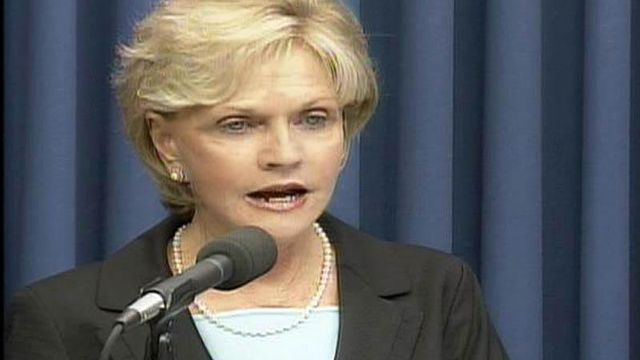Perdue cuts, adds to state budget
Gov. Beverly Perdue's budget plan would cut nearly $1 billion for the coming year by eliminating programs and cutting Medicaid abuse while expanding some programs by nearly as much.
Perdue on Tuesday unveiled her recommended changes for the second year of the two-year budget approved by the General Assembly last summer, saying her priorities were on getting people back to work, upgrading education, streamlining government and maintaining safe communities.
Fiscal analysts have projected a $788 million deficit for the 2010-11 fiscal year, which starts in July.
Most state agencies would have spending cut an additional 5 to 7 percent in the new fiscal year under Perdue's proposal, but education would be cut less than 4 percent. More than 600 state jobs would be eliminated under the plan, which would lower state spending overall by about $400 million.
"We reduce or eliminate 70 programs that are unnecessary or inefficient, saving taxpayers $200 million," she said. "I continue to focus on efficiencies in government."
The Department of Health and Human Services, which saw deep cuts last year, would see its budget increase by about 5 percent under Perdue's plan, which offsets many cuts with about $550 million in additional funding from the federal government.
"This budget focused on mental health and on Medicaid," Perdue said. "In these tough times, more people are enrolling in Medicaid."
Public schools would get money to buy hand-held devices to help teachers in lower grades assess student performance. Other education increases include limiting class sizes in kindergarten through third grade and fully funding enrollment growth in the University of North Carolina system and the state's 58 community colleges. More money also would be provided for need-based financial aid in higher education.
UNC President Erskine Bowles said in a statement that he was pleased by Perdue's call for funding enrollment growth and financial aid, but he said the across-the-board budget cuts included in her proposal go too far.
"The budget reductions reluctantly recommended by the governor will do permanent and substantial damage to the university’s academic core and will start us on a path to mediocrity, something North Carolinians have never been willing to settle for in their institutions of higher learning," Bowles said.
Under the budget proposal, public school teachers would receive their longevity-based salary increases after they were suspended last year because of the bad economy. State employees and teachers also would get a one-time bonus to make up for furloughs last year.
Perdue maintained there is "money in the system" that would allow school districts to trim spending without losing teachers, but education advocates said they weren't so sure of that.
"The General Assembly's challenge is to reverse the K-12 education job cuts," Sheri Strickland, president of the North Carolina Association of Educators, said in a statement. "Attempting to solve this budget crisis by laying off educators and placing students in overcrowded classrooms robs our children of a quality education and undermines North Carolina's economic future."
"It's a pretty substantial cut, so I think there's certainly room for debate about whether or not local schools can really meet their reduction targets without cutting back on teaching positions," said Elaine Mejia, director of the progressive N.C. Budget & Tax Center.
Perdue also calls for providing a tax credit of $250 per employee to small businesses that provide health insurance to their workers and for creating a $15 million incentive fund to encourage small businesses to hire people who have been unemployed for at least two months.
A proposed $22 million "mobility fund" would address transportation bottlenecks, and another $10 million would be used to streamline the state's databases of criminal records. Other safety-related funding includes raising the salaries of probation and parole officers to boost recruitment and retention and expanding the ability of law enforcement agencies statewide to collect DNA at the time of felony arrests.
"I am determined to change some of the platforms of state government," Perdue said. "I am determined to use technology and innovation and private-public partnerships to do more with less."
Perdue said she expects her crackdown on Medicaid fraud and waste to save the state $35 million in the coming year, and she said spending on inmate medical care would drop by $20.5 million by linking payments to the Medicare and Medicaid fee schedules.











